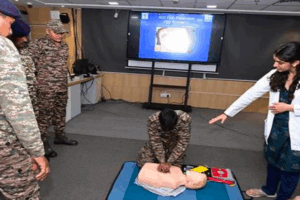In the Bihar assembly polls, it looks like from the last four assembly elections, all parties have shown faith in the candidates from the criminal background. Criminalization of politics simply means using politics or political power for nefarious gains. The data released by the Association for Democratic Reforms (ADR) on 13th October, 2025, indicates that political parties have no interest in reforming the electoral system; it has long been under the shadow of the growing criminalization of politics. The analysis of affidavits submitted by sitting Members of the Legislative Assembly (MLAs) from Bihar, obtained from the Election Commission of India and compiled by the ADR, reveals alarming trends that cast a shadow over democratic governance in the state. This situation is causing suffering in Indian democracy.
Read Also, Criminalization of politics in Bihar: A politico-criminal nexus

According to the report, a shocking 66% of the 241 sitting MLAs looked at have criminal cases pending against them, and almost half (49%) are involved in serious criminal cases. Murder, attempted murder, crimes against women, electoral offences, and corruption-related charges are some of the most serious ones. Having MLAs with criminal records like these hurts the integrity of democratic institutions and makes people really worried about law and order, governance, and ethics in Bihar’s political scene. Significantly, criminal charges are not just limited to the opposition party; it is common across all political parties. For instance, 74% of Rashtriya Janata Dal (RJD) MLAs and 64% of Bharatiya Janata Party (BJP) MLAs have stated they have criminal cases, as per the ADR report. Even smaller parties, like the Communist Party of India (CPI) and Independents, have 100% of their MLAs with criminal cases. Thus, it shows a problem that goes beyond party lines and needs to be fixed right away, figure 1 remarked.
Read Also, A Step Towards The ‘one Election’
Criminal Background Candidates in Bihar Election 2025

Moreover, the above analysis of 241 sitting MLAs reveals a worrying trend, with 158 legislators (66%) declaring criminal cases against themselves, and 119 (49%) facing serious charges. Among them, 16 have cases related to murder, 30 to attempted murder, and 8 to crimes against women. Party-wise, the highest proportions of MLAs with criminal cases are found in CPI(M), CPI, AIMIM, and independents, all of whom have 100% of their representatives facing charges. Major parties like RJD (74%), BJP (64%), and INC (82%) also show a high prevalence of criminal backgrounds. This data highlights the pervasive nature of criminalization in politics and raises critical concerns about governance and public accountability, figure 2 stated.

The ADR report claims that the issue like the criminalisation of politics in Bihar is made more challenging to tackle by the significant financial ramifications. With reported assets averaging Rs. 4.65 crores, the majority of these MLAs are also crorepatis, the recent report remarked. This suggests that wealth and political power are frequently related. This relationship between money and muscle (MM) power makes it more difficult for fair political competition to take place and results in unfair elections. Criminalisation damages public confidence in Indian democratic processes and possesses a negative effect on voters’ capacity to make informed decisions. Stronger institutional and legal frameworks are required to prevent people with serious criminal charges from running for office until proven innocent, even though the Election Commission and civil society organisations have taken steps to reveal candidate backgrounds, figure 3 stated.
Read Also, Dynastic Rule, Language, Caste And Religion Factor in The Core of Indian Politics
Political parties must reflect and pledge to run candidates with clean backgrounds if Bihar is to achieve its development goals and fortify democratic governance. At the voting booth, voters must demand accountability and put integrity ahead of cash and force. In order to rid politics of criminal elements, rebuild trust in government, and preserve the democratic values that Bihar’s citizens deserve, this report urges immediate political and legal reforms.

However, the directions of the top court have had no effect on the political parties in the selection of candidates, as they have again followed their old practice of giving tickets. Historically, for instance, criminal charges were registered against 31 per cent of candidates in the first phase of the “Bihar Assembly Elections” (BAE) 2020. All big parties have distributed 31 to 70 percent per cent of tickets to those who have criminal charges against themselves. As far as phase II is concerned, all major parties have distributed 47 per cent to 64 percent of tickets to the people having criminal cases against them. In 2020, a report by the Bihar Election Watch (BEW) and Association for Democratic Reforms (ADR) revealed that the Rashtriya Janata Dal (RJD) has fielded the maximum number of tainted candidates in the first and second phases of the “Bihar Assembly Elections” (BAE) 2020. Further, ADR and BEW have analysed the self-sworn affidavits of 1,064 out of 1,066 candidates who are contesting in the BAE Phase I and all 1,463 candidates who are contesting in the BAE Phase II, figure 4 remarked.
Read Also, Why Electoral Funding at Present is The Fountainhead of Corruption?
Comparatively, it can be seen as the large-scale“criminalisation of politics” in the Bihar Assembly election 2015 as well; an analysis by ADR, the state, shows that 57 per cent of the serving MPs and MLAs and 30 percent of the candidates for the election had declared criminal charges against themselves. Five or more candidates with criminal records contested 43 per cent of the total Assembly seats (243). In 2015, out of 81 RJD MLAs, 46 MLAs (64 per cent) had criminal charges against them, followed by BJP – 36 out of 53 MLAs have a criminal background – and JDU, which had 34 tainted MLAs in 71 seats.
Causes
The cause of criminalisation is a bond between ‘politicians and bureaucracy’. Other reasons for criminalisation are poverty, illiteracy, lack of political will, narrow self-interests, use of money and muscle power, Un-development, and prismatic nature of our social system etc. To curb the same, The top court and EC have taken many initiatives to cycle the criminalisation of politics. Although, it is parliament’s responsibility to amend the Representation of the People (RPA) Act 1951, which deals with disqualification of candidates against whom charges have been proved in court for serious offences. In spite of taking appropriate measures to amend the RPA Act, there has been an unsaid understanding among the political parties which deters Parliament to make strong law curbing criminalisation of politics.
Solutions
To counter the deepening menace of criminalization in Indian politics, immediate action must be taken on the recommendations long advanced by various committees, civil society groups, and vigilant citizens. The Supreme Court of India, as the ultimate custodian of justice and the rule of law, should hold political parties and their leaders accountable for their persistent inaction, moral apathy, and failure to enact necessary reforms. Among the most pressing measures worth implementing are:
- Permanent disqualification of candidates convicted of heinous crimes such as murder, rape, smuggling, dacoity, or kidnapping.
- Disqualification of individuals from contesting elections if charges have been framed against them for serious offences carrying a minimum punishment of five years, provided the charges were filed at least six months before the election.
- Withdrawal of tax exemptions from political parties that field candidates with criminal backgrounds.
- Inclusion of political parties under the ambit of the Right to Information (RTI) Act to ensure greater transparency and accountability.
The time for half-measures has passed. Restoring faith in India’s democratic institutions demands resolute political will and uncompromising judicial oversight. The legal framework needs to be reformed to effectively cycle the steady flow of criminals into the political process. The issues of the limited deterrence posed by disqualification upon conviction, and the delays in trials of influential persons that result in a subversion of the process of justice needs to be urgently addressed. The EC must take adequate measures to break the nexus between the criminals and the politicians. The most significant step in this direction would be checking the use of ‘black money’ in party and election funding.
Download Report, ADR Report
Consequently, many committees, like the Dinesh Goswami and Inderjeet Committees on the “electoral reforms”, have suggested state funding for elections. It will curb the use of the black money and will lead to the curbing of criminalization in politics. EC can register a political party but cannot deregister it. Regulating the affairs of a political party is significant for a cleaner electoral process. Therefore, it is imperative to strengthen the EC. It also requires a behavioural change. Until the citizens realise that people who bribe them for votes cannot be trusted and it will be to their ultimate disadvantage, the efforts to cycle criminalisation of politics will have limited impact.
(Author Trilok Singh is associated here as the CEO).




